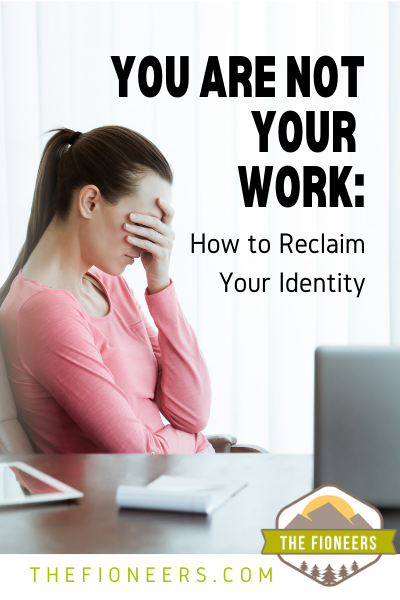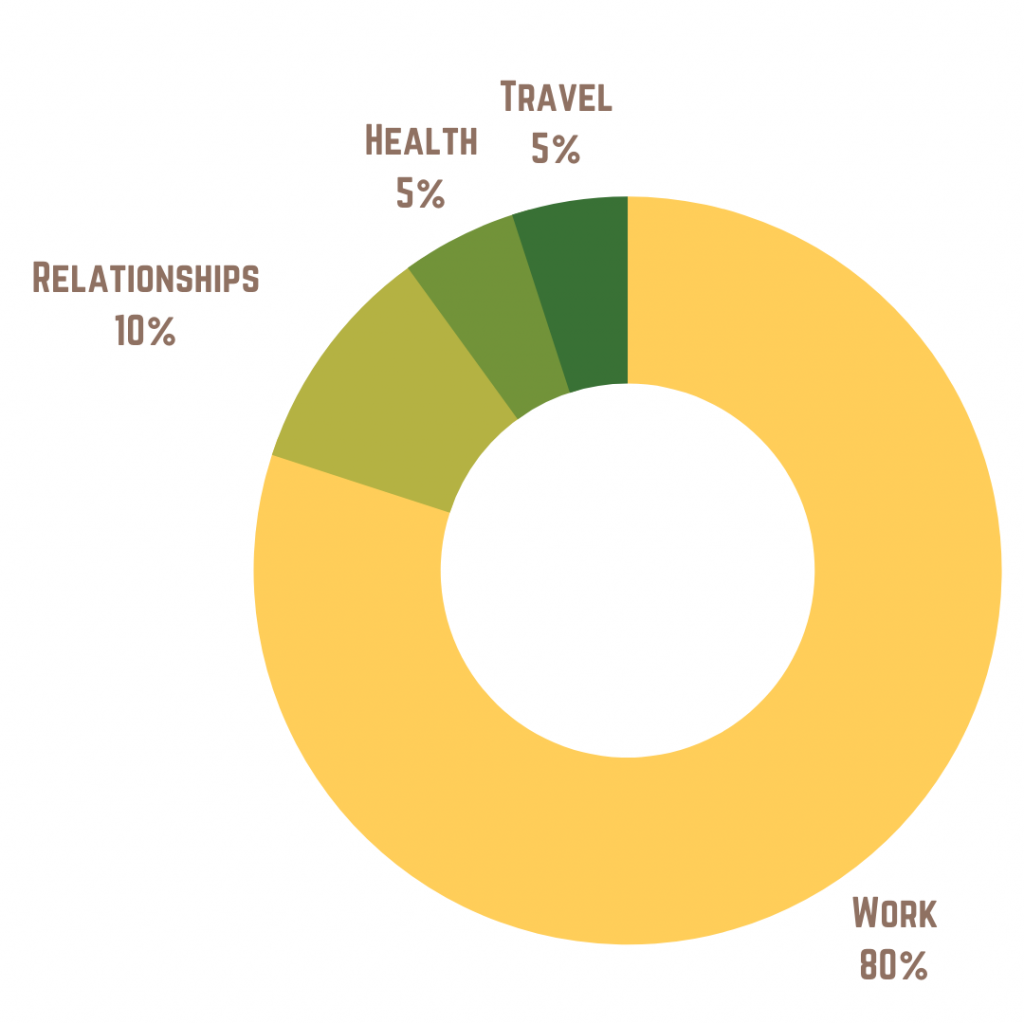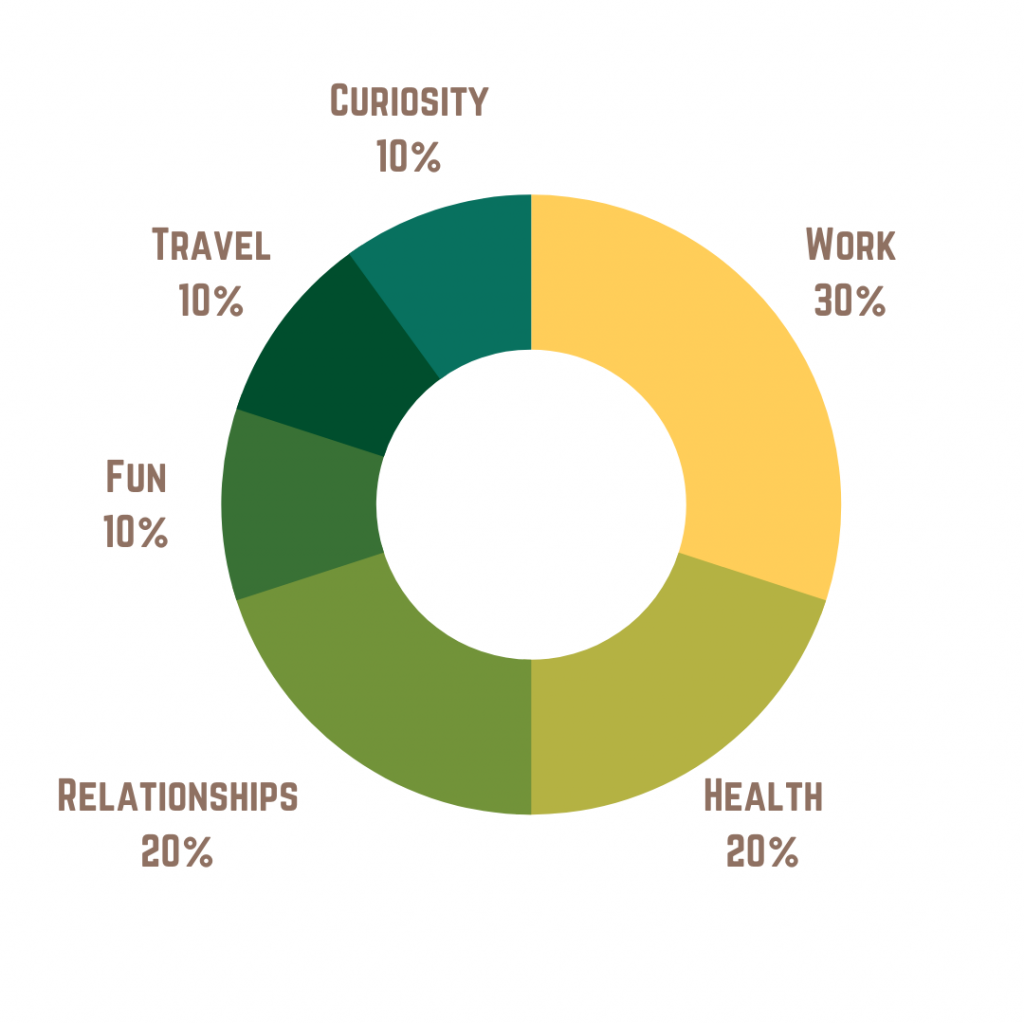
One huge reason we don’t make changes to improve our lives is that our work is such a large part of our identities.
I always think of this statement from Sam in a recent Slow FI interview about going part-time. He said, “If my identity were still closely tied to my job, there is no way I could have asked to go part-time. Why would I want to be less of who I am?”
When thinking about scaling back from work (or simply not trying quite as hard), how many of us ask this same question?
Why would I want to be less of who I am?
A few years ago, I was plagued with this mindset. Up until 2018, my life was consumed by work. All my time we spent working, commuting, preparing for work, and recovering from work. I had little time or energy to focus on anything else. I was myself as an ambitious nonprofit HR professional and little else.
Now, I realize this mindset was extremely unhealthy. It led me to have a complete mental breakdown in the middle of 2018. I had to take six months off of work to deal with severe anxiety and panic attacks.
One of the biggest reasons I stayed in my toxic job for so long was because my identity was tied up in my work. My worth was tied to my job title and how much money I made. I spent all my energy going after the next promotion. When I got it, I was even more miserable. “What was all this effort for?” I wondered.
I know that Sam and I are not alone. When I’ve asked what holds people back from making changes in their lives, I have heard this exact same thing from readers and clients alike.
If we don’t have a robust identity outside of work, it can keep us stuck.
It’s possible that our society may be starting to shift in this regard. With the great resignation happening over the last year and the rise of the Anti-Work Subreddit, it’s possible that more and more people are deciding that their work doesn’t define them.
You might be starting to feel this way too. But, maybe you aren’t sure how to disentangle your identity from your work. If so, this post is for you.
Why has work become such a large part of our identities?
In the early 1900s, economists predicted that by the 21st century, people would only work 15 hours/week. With the rise of automation and efficiency, people would spend most of their time in leisure. This prediction did not come to fruition, particularly for college-educated people.
Along with the rise of automation came the decline in community, religion, and ways that people found meaning outside of work. Without external forces to ground them, many people have started to treat work in the ways that people used to treat religion. From work, they expect to find purpose, community, and identity.
I love this quote from the Atlantic, “The economists of the 20th century did not foresee that work might evolve from a means of material production to a means of identity production. They failed to anticipate that for college-educated elites, it would morph into a kind of religion, promising identity, transcendence, and community.”
Our society, and particularly the media, has sent us the message that the meaning of life can be found in our work. Each show and movie we watch indoctrinates us, and we start to believe that work can provide us with the ultimate fulfillment.
Just look at any superhero movie (which I love but now know I need to take with a grain of salt). In particular, think about Captain America in Avenger’s Endgame. The short story is that five years before the movie, an evil being figured out how to eliminate half of life on earth. For the full five years, Captain America spent his time trying to figure out how to reverse it. He put everything into his work. As kids (and sometimes adults), we look at that and think, “I wish I had a purpose as strong as that.”
Or look at any medical, crime, or law drama. You’d be hard-pressed to find someone portrayed as a full 3-dimensional human being with a rich life outside of work. They are lawyers, doctors, detectives, and little else. Their identities are fully tied up in their work, and it’s celebrated and rewarded.
As we are inundated with these messages, we start to believe this is true. Our work is the most important thing in our life, right? It’s where we’ll find our meaning, purpose, and community, right?
For some people, overworking is sometimes comfortable. Life can feel crazy and out of control sometimes. But at work, there are often clear-cut systems, steps, goals, etc. For some people, work is an escape from the challenges of life that don’t have clear-cut solutions. So many people use crazy-busy as a way to numb their emotions.
Lastly, it’s hard to disconnect from work. With the rise of technology, we have a constant connection to our phones and emails. Now that so many people are working from home, it can be even harder to disconnect without being intentional.
The Impacts of Over-Identifying with Our Work
When over-identify with work (or become “enmeshed” in our work), it can lead to burnout and other mental health challenges.
I read an interesting article recently about how over-identifying with work leads us to “objectify” ourselves. I always thought of objectification as judging someone’s worth by their physical appearance. But objectification also includes judging someone by what they can do for you.
Objectification means that you reduce someone’s (or your own) self-worth down to a single characteristic. This could be related to physical appearance, work, or something else entirely. Regardless, the outcome is the same. Being objectified increases depression, reduced problem-solving abilities and leads us to sacrifice other areas of our life.

The biggest problem with work objectification is not that our bosses and employers do this to us. The biggest problem is that we self-objectify. Our self-worth becomes so entangled with our work and what we can produce.
Just like when I thought my self-worth was tied to my job title and salary, this can lead to depression. We might also sacrifice other important parts of our life outside of work. Neglecting our health, relationships, and personal fulfillment can then lead to burnout.
Lastly, being too enmeshed in our work keeps us from developing an independent sense of self. When we focus too much on our work (and reduce ourselves to this one characteristic), we start to disengage from everything else in our life. This leads to feeling disconnected from who we are and what we truly want. As a result, we start to lack confidence in our choices which leads us to feel even more disconnected.
Reducing our identity to our work can lead to burnout, other mental health problems, and a feeling of disconnect from who we really are and what we want.
How to Reclaim Your Identity
I have my own ideas on how to expand and reclaim your identity, but I wanted to make sure that this post was backed by research. So, I read many articles from different publications, including Psychology Today, Psych Central, The Atlantic, Harvard Business Review, and more.

There is a strong consensus across different resources on how to go about expanding your identity beyond work.
First, Know What it Means to Reclaim Your Identity
Before we can get into how it’s important to dive into what. What does it actually mean to reclaim and expand our identity? What is the goal?
Here’s what it means:
- Work becomes one of many important parts of our identity.
- We reject hustle culture and recognize that our value is not found in how much we can produce.
- We have a well-developed sense of self, knowing what we uniquely enjoy and value (not what we think we should enjoy and value).
- We have our own sense of purpose that guides our decisions.
Once you know where you want to be, you can start to implement strategies to help you get there.
Strategy #1: Reclaim Your Time
The first strategy shared by almost all the resources was to reclaim your time. Just like financial freedom, you don’t have to look at this in an all-or-nothing way. You don’t have to be fully financially independent to reclaim some of your time.
Here are some simple ways that you could get started:
- Take all your vacation time
- Intentionally disconnect from work (and thinking about work) on weekends
- Set boundaries around when you will start and finish working
- Negotiate certain work responsibilities to be taken off your plate
- Say “no” more often.
As you get further into your financial freedom journey, here are additional things you could consider
- Take several months off for a career break or sabbatical
- Reduce your work hours and go part-time
All these things allow us to cultivate open space in our lives. Then, we get to decide how we want to fill that time, which takes us to strategies 2 and 3.
Strategy #2: Articulate What’s Most Important to You
Opening up space in your days can help you to discover and articulate what is most important to you. You can do this in a variety of ways. You can write or journal, discuss these things with a trusted friend, go to therapy, or a combination of these things. The important thing is that you cultivate a space where you can go deep and figure out what you truly want and believe.

Some of the key questions you’ll want to answer include:
- What is my goal for work?
- How do I want work to fit into my life?
- What do I love to do?
- What matters most to me?
- What are my values?
- What do I want to make time for?
- What do I want my legacy to be? (What do I want to be known for?)
- What skills and strengths do I have that I want to use to make the world better?
- How can I do what’s important to me in a way that feels life-giving?
To be clear, you won’t necessarily be able to sit down and figure out the answers to these things all in one sitting. You’ll likely need to spend time experimenting and actually doing stuff to see what you truly love and value, which brings us to strategy 3.
Strategy #3: Align Your Reclaimed Time with What’s Most Important to You
Instead of immediately filling your time with other things, take time to figure out how you actually want to spend it.
Do you want to use your time to focus on:
- Spending more time with your family or friends?
- Building new relationships outside of your professional circle?
- Hobbies or activities that you love (or could love) to do?
- Your mental and/or physical health?
- Learning a new skill?
- Cultivating your curiosity?
- Volunteering for a cause you care about?
What Happened with I Reclaimed My Identity
Before going through my mental health crisis in 2018, my life was completely consumed by work.

80% of my energy was focused on work. The other 20% was split across relationships, health, and travel.
After going through my mental health crisis in 2018, I had an incredible opportunity to reclaim my time. I was able to take a 6-month medical leave. Disconnecting from work in this way allowed me to see things in a whole new way.
I spent time figuring out what I valued most. I started to invest so much more of my time into my mental and physical health, relationships, and figuring out what I actually enjoyed doing.
Having a stronger sense of self (and what I wanted) gave me the confidence to make different choices than what was expected of me by society. After recovering, I opted out of full-time work. Six months prior, I could never have imagined choosing to work part-time. Opting out of a high salary and elevated title would have seemed like a failure. But, I had redefined success for myself.
Over the last few years, I’ve completely recovered from burnout. My mental health has improved significantly. Ultimately, I opted out of traditional work entirely to run my own lifestyle business. I don’t care if the business grows. I simply want it to provide me with the lifestyle I want.
Here’s what my life looks like now.

My life is now much richer. I have a lot more room in my life for curiosity, fun, health, and relationships – all areas that are very important to me.
Lifestyle Design Can Help You Reclaim Your Identity
As I was researching for this post, I was struck by how much the recommendations aligned with lifestyle design.
When designing our lives, the very first step is to get off autopilot and start to live a more intentional life.
Strategies that enabled us to do this include:
- Self-care by subtraction (i.e. reclaiming your time by eliminating things that drain your energy)
- Rediscovering Joy
- Becoming more mindful of your thoughts and feelings (rather than how you think you should feel) to figure out what’s most important to you
Once you start to live more intentionally, you can take steps to design your life, including:
- Figuring out the elements of your ideal life, which includes the things you love to do, what matters most to you, and how to do this all in a way that feels great!
- Using what you learn about what you want to dream big about what the future holds.
- Figure out how to take ideas and translate them into experiments (i.e. small ways you can try things out to answer a question or learn something valuable).
So many of these actions align with the three strategies to reclaim our identity:
- Reclaim our time
- Articulate what’s most important to us
- Align our reclaimed time with what’s most important to us (and the process of figuring it out).
It’s time to take action to reclaim your identity. You are not your work!
If you’d like support as you reclaim your identity and start on your own lifestyle design process, I’d like to point you to a few helpful resources:
- Blogpost: Get Your Life Off Autopilot
- Blogpost: What you Must Do Before You Can Design Your Life
- Blogpost: Actively Choose to Design Your Life
- Online Course: 10-Day Intentional Living Challenge
- Group Coaching: Design a Life You Love Waitlist

























Love this Jessica! And your update to illustrate how you have re-allocated time to fit your priorities!
Thanks Theresa!
Yeah saying no is fundamentally important to keep your sanity at any job. At my current job, a team works almost every weekend. We’re salaried and don’t get OT. I’m just like…why?
I think it is important to think of a job as what it is a lot of times: time for money. If you’ve got a job that you’re truly deeply passionate about to the point where it is no longer “work” (though this is a bit rare), then by all means pursue it passionately. But I’d imagine the vast majority of people overworking themselves are just doing it because everyone else is and because there’s pressure from managers for people to work extra time.
Also – I think that you can pursue work you love passionately and still not make it the center of your life! That’s my goal, for sure! 🙂
Absolutely this is the way to go, as workers we need to reclaim our time and prioritise it to make our life more purposeful.